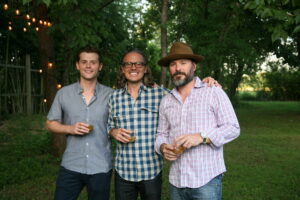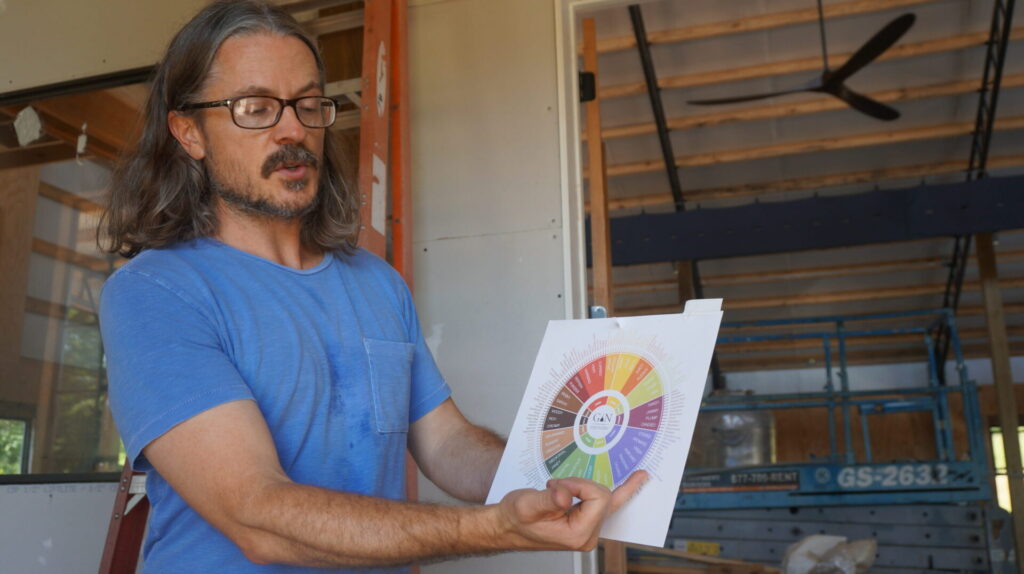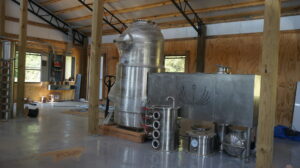Featured
Taylor’s ‘Wonderbird Spirits’ is Mississippi’s First Grain-to-Glass Gin Distillery
Anna Grace Usery
Editor-in-Chief
anna.grace.usery@hottytoddy.com

Along the winding, pastoral curves of Old Taylor Road, nestled in an unassuming pasture about a mile north of Taylor is a small black building. It’s reached by a long, freshly-laid gravel drive and surrounded by trucks loaded with building materials, speaking to the beehive of construction activity going on inside.
Two 40-somethings with sawdust in their peppered hair emerged from the side of the building with extended hands and sweat-stained t-shirts.

Co-owners Chand Harlow, Rob Forster and Thomas Alexander are establishing Mississippi’s first grain-to-glass distillery, Wonderbird Spirits. Photo courtesy of Rob Forster.
Rob Forster and Thomas Alexander, former college roommates, strolled to the parking lot with friendly grins. As they head back inside the concreted inlay with barren walls, unopened paint cans, strewn steel parts and pieces of what looked like the Iron Giant in the center of the room, they begin to tell the story of the passion project they’re putting into play. Along with third business partner Chand Harlow, they are building, creating and establishing Mississippi’s first grain-to-glass gin distillery, Wonderbird Spirits.
There isn’t a direct source for the distillery’s name, but it did develop out of an exhaustive search among the three partners for symbolic significance grounded in Mississippi. Among the many researched topics were William Faulkner, Native American history, symbology, regional geology and the migratory patterns of local wildlife. When Forster and Alexander discovered that they had both been independently undertaking extensive bird research, they decided on a name that encompassed all their passions, with a Faulkner flair. The Wonderbird logo is clean and linear, and it emulates a bird in flight.
Forster and Alexander met at the University of Virginia and immediately recognized a broad intersection of shared interests, travel and spirits among them. Though Oxford didn’t originally shape their worldviews, the people most influential to them did. Rob’s father and Thomas’s wife call Ole Miss their alma mater, so the strong Mississippi roots took their fierce hold and eventually circled the college roommates back into the area. When the two met Harlow, a Laurel, Mississippi native with prior alcohol industry experience, a partnership was quickly born.
Forster and Alexander are both corporate ex-pats. Finally leaving the bureaucratic grind of those career paths was a welcoming revelation, they said. Both had families with small children, so they began looking into paths that leveraged their skills, interests and experience and that might also provide them with more latitude and family time.
“The stars just aligned when we began thinking about distilling,” Forster said.
After committing to and further developing the distillery concept, the three searched for property in the Oxford area.
“I had long admired an old farm property on Old Taylor Road and dreamed of one day having a distillery there,” Harlow said.
The three approached the owner and, in due course, secured their current location. After navigating a range of federal, state and local regulations, they were granted resort status by the state and awarded the requisite licenses to operate.
“We’ve spent the last six months on our hands and knees trying to get this piece of property cleaned up,” Forster said. “We love Taylor and its proximity to Oxford. We just needed to find the right piece of land.”
The partners envision the distillery to be a destination in the constellation of Oxford, Mississippi’s biggest attractions—along with food, sports and literature. Even as they welcome those from different states, countries and continents, they want the essence of the experience—from sip to stroll—to be as local as possible. To capture that local influence, they are working with a forager to survey the property in hopes of using ingredients native to the area to flavor the craft gin. The forager has helped them identify more than 20 naturally-growing, Mississippi-specific flora that Forster and Alexander said could be used as flavoring agents in the distilling process, among them Wood Sorrel, Elderflower, Kudzu and Goldenrod.
Where many distillers elect to purchase pre-made neutral grain spirits shipped in from elsewhere, the Wonderbird distillery will operate on a grain-to-glass basis. This means it will use agricultural products to ferment the alcohol, which will eventually become gin. While this grain-to-glass approach is more time-consuming and labor-intensive, it gives the distillery the ability to locally source the base ingredients of the product, affording Wonderbird the best opportunity to make the distinctive gin it intends to bring to market.

Rob Forster explains the different flavor profiles of gin and botanicals. Photo by Talbert Toole.
Local corn and sweet potatoes will be the integral components of the alcohol fermentation, which will then be refined in a Mobile, Alabama-made still emblazoned with the Wonderbird logo. As for the gin itself, the owners said they envision Wonderbird’s flavors to embody a “beautiful martini gin.” As they motioned their hands toward their nostrils to waft the Mississippi-tinted air, they described their flagship gin as classic and dry, with hints of citrus, pine and floral aromas. To hit those specific flavors, the partners will work with a renowned gin expert and also employ an aroma kit—a small box filled with 30-plus vials of specific smells like juniper, coriander, orris root, vanilla, licorice and rose—to help guide their flagship gin recipe.
“Distilling is a science, but there’s an art to it as well that we are excited for people to learn about,” Alexander said.
Even if you’re not a fan of gin, the distillery will exude an ambiance worth the visit. In true Mississippi fashion, there’s a porch where patrons can gather, sit a spell and spin yarns over one of four, quarter-ounce pours Mississippi state law allows you to imbibe on the premises. The hinged, folding windows will crack open to allow in sunshine during the day and a cool Mississippi breeze in the evening. A tasting room and reception area will greet visitors upon entrance, with a row of barstools and a variety of books and botanicals lining the shelves of large bookcases. A long-term vision is to enhance the twenty acres and tributary system surrounding Wonderbird with a garden to grow botanical ingredients (for the gin) and walking paths for visitors to enjoy.
The hope is to make Wonderbird’s gin Oxford’s gin, the owners said.
“We want to develop good relationships with Oxford’s restaurants and bars so when patrons ask bartenders what they might suggest, they can recommend making a drink with our gin,” Forster said.

The gin distillery’s equipment is currently being put together. Photo by Talbert Toole.
With an abundance of liquor stores in the Oxford area, Wonderbird’s partners will also seek room on the shelves for its flagship liquor. Though production is a couple of months away, a bottle has been selected and labels are being designed. The bottle, tall and slender, will present a subtle green tint. The label, with earthy overtones and pops of color to draw the eye, will complement the bright liquid inside.
Although it has taken a year and a half to arrive here, the owners feel grateful for the support they have received from the Oxford community, and they are excited to deliver what they hope will be a one-of-a-kind experience to Mississippi.
“We look forward to introducing Wonderbird to the world, and aspire to make it something that this area will be proud to call its own,” Alexander said.
The owners said they plan to be open to the public by September 2018.










































